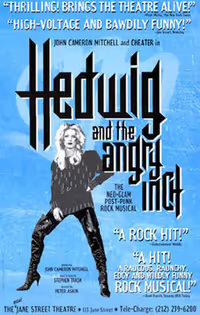Weekly running costs for broadway shows
MNC77
Stand-by Joined: 5/5/13
#1Weekly running costs for broadway shows
Posted: 3/28/14 at 5:25pmI'm trying to do some research on the breakeven points for different shows on broadway. If anyone has any information about the breakeven for any of the shows, it would be very helpful
bobs3
Broadway Legend Joined: 4/8/12
#2Weekly running costs for broadway shows
Posted: 3/29/14 at 3:01amThe general rule for a musical is 50% of the potential weekly gross but contracts of royalty participants usually contain a clause that allows for reduced or waived royalties if a show doesn't reach its weekly nut and theater owners will sometimes offer reduced rent to keep a show running (unless they have another show waiting to come into the house).
#2Weekly running costs for broadway shows
Posted: 3/29/14 at 3:17amThe 50% thing is dropped here a lot now. Can you provide some examples of known nuts so we can test that theory? For example, the FOLLIES nut was over 100k was than half of its gross potential.
#3Weekly running costs for broadway shows
Posted: 3/29/14 at 4:10am
Well the 50% thing is not a written rule, it is good to approximate the running costs.
Other factors that would increase the nut:
-Star casting
-Large cast/orchestra
-Difficult technical requirements
-Revivals
#4Weekly running costs for broadway shows
Posted: 3/29/14 at 10:58amthe answer bears no relation whatsoever to grosses, and I cannot imagine how anyone could think it would. On this theaory, every show in the same theatre would have the same expenses. There are numerous shows for which the nut has been disclosed, and there are others for which it has been specifically approximated. You can google for any given show or if you have a specific one you want to know about then you can ask and maybe someone has seen the info. But whatever you do, ignore rules (even rules of thumb) because they do not exist and are meaningless.
sassylash3s
Stand-by Joined: 7/5/11
#5Weekly running costs for broadway shows
Posted: 3/29/14 at 11:15amI'm curious. What would make a revival more expensive to run then an original production?
#6Weekly running costs for broadway shows
Posted: 3/29/14 at 11:20amSecuring the rights to perform a show can be a lengthy and costly process, for one thing, but part of your running costs is typically going BACK to the original writes/producers/etc each week to pay the royalties fees.
#7Weekly running costs for broadway shows
Posted: 3/29/14 at 11:42am
the answer bears no relation whatsoever to grosses, and I cannot imagine how anyone could think it would. On this theaory, every show in the same theatre would have the same expenses. There are numerous shows for which the nut has been disclosed, and there are others for which it has been specifically approximated. You can google for any given show or if you have a specific one you want to know about then you can ask and maybe someone has seen the info. But whatever you do, ignore rules (even rules of thumb) because they do not exist and are meaningless.
Nobody ever said anything about it relating to GROSSES. They said that a general rule of thumb is about 50% of POTENTIAL GROSS. There's a difference. In what way would every show in the same theater have the same expenses? That makes no sense whatsoever. As stated before, lots of things factor into the weekly nut: big stars, big cast/orchestra, any special effects..... the theater it plays in only charges rent, it doesn't dictate total weekly costs. Not sure why you think that.
#8Weekly running costs for broadway shows
Posted: 3/29/14 at 12:15pmto underscore my original point, weekly running costs bear no relation to grosses, whether they be actual, potential or otherwise. It is a completely ludicrous metric. to suggest gross in any way supports a rule of thumb vis a vis expenses is just wrong. It is like saying the price of food correlates to calories.
#9Weekly running costs for broadway shows
Posted: 3/29/14 at 3:41pmI understand that you do not agree with this theory. You've made that VERY clear. What I do not understand is your statement that every show in the same theater would have the same weekly nut. Would you care to elaborate on that?
#10Weekly running costs for broadway shows
Posted: 3/29/14 at 4:49pmhappy to. If there were a correlation between weekly running costs and potential gross, as you posit, then it would follow that every show in the same theatre, which would have approximately the same potential gross, would have approximately the same weekly expenses. In fact, there is no such correlation and it is demonstrably untrue. In fact, if you go through 100 budget lines you will find that exactly zero of them are predictable based on potential gross.
#11Weekly running costs for broadway shows
Posted: 3/29/14 at 4:58pmEvery show in the same theater does NOT have the same potential gross. Rent had a potential gross of $768,979 around the time of its closing. Million Dollar Quarter, which played the same theater (Nederland) had a potential gross of $1,109,700. Newsies, which occupies the theater now, has a potential gross of $1,208,958. Three different potential grosses, three different shows, one single theater.
#12Weekly running costs for broadway shows
Posted: 3/29/14 at 5:04pmIncreases in each shows ticket prices are a good part of the increase in grosses.
#13Weekly running costs for broadway shows
Posted: 3/29/14 at 5:09pm
"Every show in the same theater does NOT have the same potential gross. Rent had a potential gross of $768,979 around the time of its closing. Million Dollar Quarter, which played the same theater (Nederland) had a potential gross of $1,109,700. Newsies, which occupies the theater now, has a potential gross of $1,208,958. Three different potential grosses, three different shows, one single theater."
This is only due to ticket prices though.
Look, I'm not saying that the 50% of potential grosses thing isn't necessarily false but we could easily test this by someone posting the known weekly nut of shows and comparing.
FOLLIES was 625-650k, which had almost every factor that mjohnson2 listed including Star Casting, Large cast/Orchestra, a Revival yet was still over 100k less than the "50% indicator". To me this is not precise enough.
#14Weekly running costs for broadway shows
Posted: 3/29/14 at 5:19pmGinger, are you just trying to be obtuse? Changes over time in ticket prices also do not correlate to changes in running costs. These things are independent, have nothing to do with each other. Wicked's potential gross has increased by roughly 50%. Do you honestly think that tells us anything about its weekly expenses?
#15Weekly running costs for broadway shows
Posted: 3/29/14 at 5:21pmThey probably do correlate a little bit in the sense that over time due to inflation and other factors I'm sure it is more expensive to run the same show now than it would have been 15 years ago. However, I agree with your overall point that it seems like a weird way to gauge a nut unless producers intentionally price their shows so it works out that way.
#16Weekly running costs for broadway shows
Posted: 3/29/14 at 5:38pm
Gingerbread: the point is: assuming two different shows played in the same theater AT THE SAME TIME (ie so their ticket prices were comparable) then it doesn't matter what show is IN the theater, the costs would all be the same. Ticket price x number of seats.
#17Weekly running costs for broadway shows
Posted: 3/29/14 at 6:01pmqolbinau--things do not "correlate" because the are headed in the same direction. We would not say that the price of apples in New York State correlates to the price of oranges in Florida simply because the cost of production of both has increased over the last decade. In fact, Wicked's discernible costs have not gone up in any semblance of the same proportion as has its potential gross, actual gross or conceivable gross. As just a single example, Wicked, for many years, spent a ridiculously small amount on advertising. That savings (in the millions) has nothing to do with changes in its gross. (In fact, the gross increased inversely to the expenditure during that period.) Now, they have started spending fairly heavily on ads. That, likewise, has nothing to do with the potential gross, but it could easily shift the expenses by well into double digits. You can literally perform a similar analysis on every line of the weekly expenses.
#18Weekly running costs for broadway shows
Posted: 3/29/14 at 6:31pm
Actually things that are headed in the same direction is exactly what a correlation is, regardless of what the actual causal factor is. In your example of Apples and Oranges in Florida if you were to plot the two numbers side-by-side year after year into SPSS and run a correlation analysis they would be correlated.
I'm sure that Wicked costs more expensive to run now in 2013 than it did in 2003 - rent is more expensive, salaries are larger etc.. Additionally, I'm sure the "potential gross" is higher now in Wicked because they have raised the ticket prices. If you literally did a correlation between potential gross and Wicked weekly expenses I bet there would be at least a small positive correlation. And there is probably at least a small causal relationship here too. I'm pretty sure producers would want to charge more as costs increases. And as they charge more the potential gross increases.
I'm still not claiming that 50% of Potential Gross is a good indicator of the weekly nut. But I can see how they would be SOME relationship.
#19Weekly running costs for broadway shows
Posted: 3/29/14 at 6:46pm
I am not sure you are actually saying anything substantially different than I am, qolbinau, but in every discipline with which I am familiar, a correlation implies an intelligent dependency. Apples and oranges don't correlate because generalized inflation doesn't represent a meaningful dependence. (Things like weather, imports, demand, etc do) It is the same for theatre tickets and theatre expenses. Hence my advertising example.
I know people love rules, but as one of my mentors taught me, rule #1 must always be that there are not always rules. It works the same in the theatre. A show may break all the rules and succeed; it may follow all the rules and fail.
#20Weekly running costs for broadway shows
Posted: 3/29/14 at 11:57pmIs there a point where running a show gets cheaper? Like, when you have an expensive show like Wicked or Phantom that uses hydraulics and stuff, do they eventually pay off that cost and therefore it becomes slightly cheaper?
#21Weekly running costs for broadway shows
Posted: 3/30/14 at 12:03am
Is there a point where running a show gets cheaper?
There may be exceptions but running costs will stay the same or get higher.
The shows need to maintain or even replace sets and costumes as the run keeps getting longer. Union, inspection and other fees require for a show to operate almost as when it opened, they can't get away with old machinery.
#22Weekly running costs for broadway shows
Posted: 3/30/14 at 12:10am
Consider other factors like costumes. Every time a performer changes, it is a brand new set of costumes. The materials go up in price and so does the labor. Ticket prices will rise according to costs.
This is also why shows that take a gamble with a minimalist approach (Chicago) can run for decades if successful and those like Spider-Man, well...
#23Weekly running costs for broadway shows
Posted: 3/30/14 at 12:23amAs with most questions like the one Ripped asks, there is no singular answer. There are savings in some shows that can be quite substantial, whereas in others, no reductions ever occur. One example that I mentioned before is advertising for long running shows. If you look, you will notice that some shows advertise only minimally whereas others advertise a lot. That can be a multimillion dollar differential. Likewise, some shows, once established, downgrade their casting, so that the original "star" is replaced by someone who makes much less. There are dozens of other places where, as in any business, producers and general managers are on the lookout for savings large and small. Production elements usually don't offer much in the way of savings, because as the other post says maintenance is expensive.
Videos









